"As such, the hero’s perhaps attractive rebellion is offset by his continually emphasized weaknesses: he is spineless, cruel, narcissistic, and a virtual Hindu Hamlet in his frustrating inability to act, especially when action seems most necessary."
- Corey Creekmur's review of Devdas
Oh, Devdas. How you torment us.
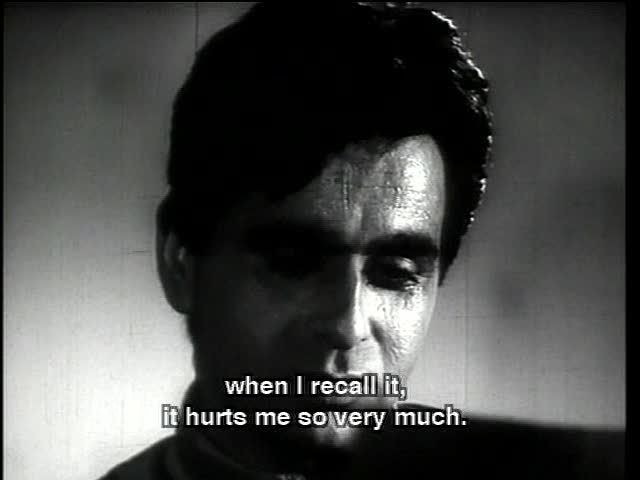
No kidding.
Nominally, we hate Devdas, and yet, like the man himself, we keep coming back for more. Watching his narcissistic, self-centred spiral into liver-failing oblivion is so, well, addictive. And it doesn't matter who's playing him: all our past Man of the Moments - Shah Rukh Khan, Amitabh Bachchan, Shashi Kapoor and now, Dilip Kumar - fail to make us sympathize with Devdas. Thankfully, quiet, sensitive Dilip comes closest in making us almost - almost - tolerate and pity him.
Soaked in the gentle realism of regional Bengali cinema (think Satyajit Ray's sun-dappled forests), Bimal Roy's Devdas is considered the best adaptation. Perhaps this is because it is most faithful to the book's vibe. Not that we've read the book, but this version - with its emotional complexity - certainly felt more faithful to something.
The film opens with an extended look at Devdas and Paro as children. Already as children, their personalities and their relationship are starkly evident: Devdas is older, macho, self-absorbed and entitled. He's a little peacock, and he thrives on Paro's adulations, even if he pretends not to. Meanwhile, Paro is his main devotee - in one scene, likening herself to Radha and he, Krishna - she laughs exaggeratedly at his shenanigans, and she relishes taking care of him when he hides from his abusive father. However, despite her simple devotion, she is also proud and prone to sulking. In one scene, Devdas slaps her. Upset, Paro immediately strikes back: she runs to Devdas' household and tells on him, which leads to Devdas getting a severe beating. Time passes, wounds heal, and Devdas and Paro reunite, all forgiven.
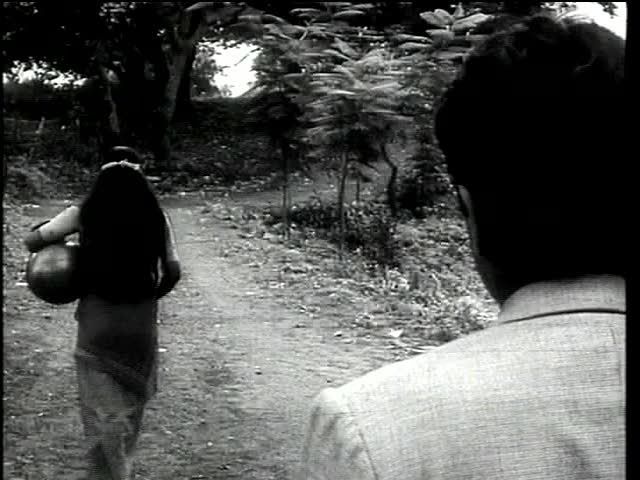
Oh, Bimal Roy, how we love thee.
The rest of the plot is well-known: Devdas is sent to Calcutta for his education and he returns to the little village a big city man. When Paro and Devdas are reunited as adults, the sparks fly. Yet Devdas' family refuses Paro's marriage proposal since Paro's family is much too low-caste. When Paro begs Devdas to do something, even risking her reputation by breaking into his bedroom one night (big taboo!), Devdas grows spineless and flees back to the city. Moping aimlessly, he writes Paro a letter claiming that he never loved her, but then regrets sending it. Meanwhile, boozy friend Chunni Babu (Motilal, reprising his role from Jagte Raho dhoti for flower garland) slowly introduces Devdas to the world of wine and women. Paro is married off to a much-older widower, becoming the stepmother to adult children. While Paro makes the most of her situation, Devdas skips the pleasantries and moves immediately to raging alcoholism. His new friend, Chandramukhi (Vyjayanthimala), develops a massive crush on his Byronic studliness and attempts (unsuccesfully) to rescue him from himself. Alas and woe ensue.
Although the character of Devdas retains his general unlikability, this film is leaps and bounds better than the 2002 Sanjay Leela Bhansali version. We at the PPCC don't mind unlikable anti-heroes - heck, we love those complex, tormented knuckleheads. Fab... and thorny, like a rose! What made the 2002 Devdas so problematic was that there was:
(1) No apparent link between Shah Rukh's jerk Devdas and Aishwarya's weepy, brainless Paro.
(2) No apparent personality on the part of either women, Paro or Chandramukhi.
(3) Only grovelling and bombastic sympathy for Devdas' self-induced plight.
The University of Iowa people - as always - said it right by noting that Bhansali's Devdas overemphasizes what should be subtle emotional nuances; the delicate and complex are enlarged to grotesque, silly size, and much is lost.
Thankfully, Bimal Roy's film has a much softer touch. It presents a believable and poignant relationship between Devdas and Paro - a relationship based on mutual dependency and life-long affection. Their doom is genuinely sad. Paro is also, thankfully, given a strong will and a complex personality. Unlike Aishwarya's devotional zombie, Suchitra Sen's Paro is fiery and proud. Indeed, the best scene turns out to be the famous moment when Devdas strikes Paro (as adults), leaving a scar on her forehead. Their argument - mutually abusive, scathing and needy - is painful and poignant to watch.
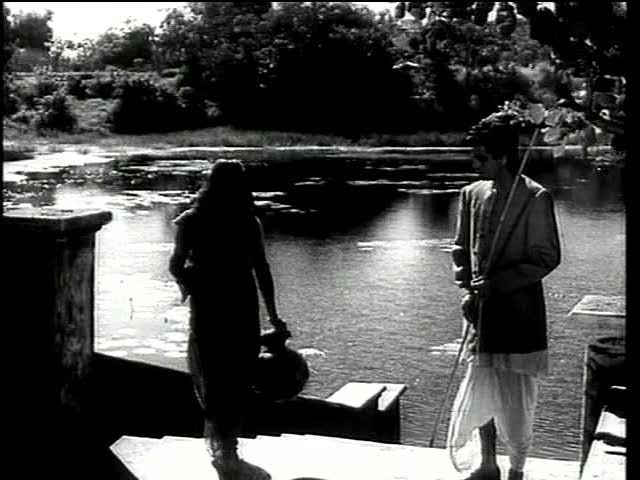
A gorgeous moment, aesthetically. Prelude to the argument.
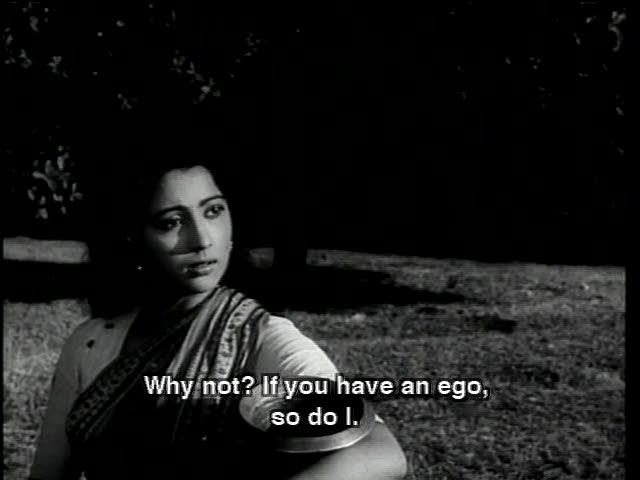
Amen, sister. You smack him down.
Regarding the problematic Sympathy for Devdas (the name of the PPCC's new band, by the way), we think the main structural problem is embodied in Chandramukhi, patron saint of self-neglecting servileness. Chandramukhi is the archetypal Whore (cf: Paro as archetypal Virgin): the fallen woman, dreaming to break free of the gutter and ascend back to purity. When Devdas initially meets Chandramukhi, he is disgusted - and tells her so. His abuse continues merrily along, with Chandramukhi lapping it up and loving it. Aargh! Indeed, Chandramukhi "reforms" herself in an effort to please Devdas - becoming a traditional Good Indian Wife, complete with pooja set.
Which brings us to...
Yes. Call us presumptious, but we think we've got it. So, all right: you've got a seriously flawed but still potentially sympathetic alcoholic ex-lover played, to the best of his ability, by the man of the moment. You've got a fiery, stubborn, self-defeatingly devotional heroine. What's the problem? The problem is Chandramukhi! Brainless, masochistic Chandramukhi! It's that damned Chandramukhi woman that turns the film into a Virgins and Whores fest, misogynistic, meekness pornography, complete with a man who can do no wrong, even when he clearly does wrong.
So how do we fix it? We look to Naina.
Yes, Naina! That film does a lot of things wrong, but it does some things really, really right. And one of the things it does right is present a Devdas-esque love triangle which is evocative and brutal, but blessedly gender friendly. That is, you've got your Devdasian Ravi (played by the scrumptious Shashi Kapoor, our number one), you've got your virginal and devotional Paro-esque Jyothi (played by the adorable and young Moushmi Chatterjee), and then you've got your complex, love-hating, drinking buddy "whore" ??? (played by some lady). That is, the courtesan doesn't feel ashamed and immoral around Devdas/Ravi that she has to sell her body. She doesn't judge all the drinking and hardcore partying. And she doesn't allow herself to be judged. Indeed, the poignant relationship between Naina's Ravi and his courtesan drinking buddy is the excessive, fun-loving hedonism that barely masks their mutual pain.
THAT is what Devdas needs. THAT is what Chandramukhi and Devdas should be like. Chandramukhi should be the devil on Devdas' shoulder. She should have dug herself into the same hole of despair and drinking that Devdas is in, and therefore she should be well-acquainted with the whole self-hating, self-pitying cycle. It would be so gloriously, pitch perfectly emo.
Anyway.
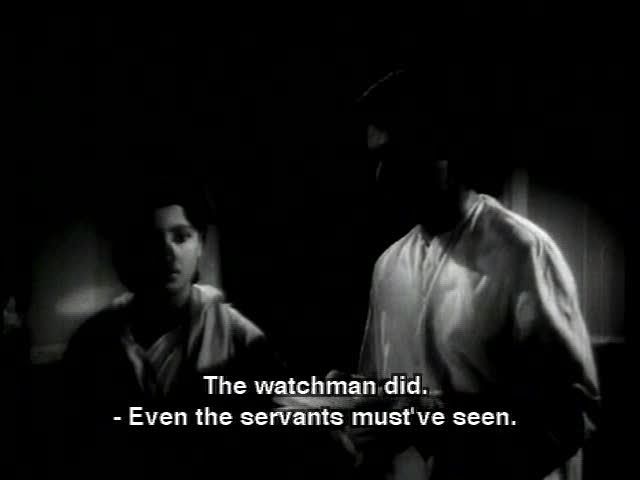
Our DVD had a lighting issue.
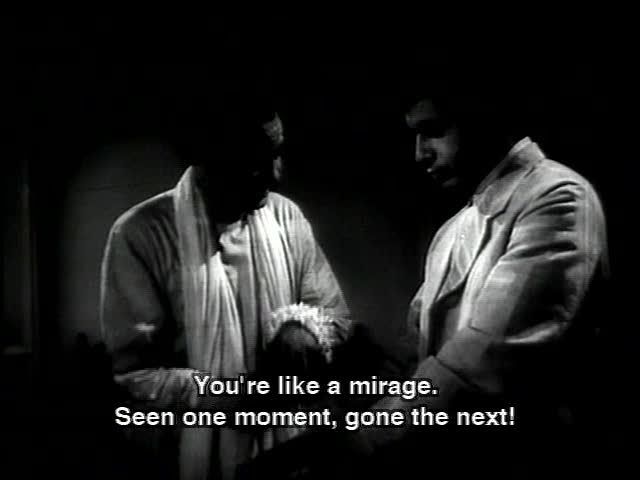
It was hard to see anybody!
So Dilip Kumar is very effective as Devdas - presenting him as a morally gray anti-hero with an emphasis on the anti. He drips with, as the Lutgendorf reviewer, Corey Creekmur, likens, Hamletian indecision and acidic self-pity.
The women, as we mentioned, seemed to have grown some self-respect in this one, thank goodness. Or at least Paro has - well-played by Suchitra Sen, who gravitates between misty-eyed infatuation and steely stubborness. Indeed, one of the sweetest moments of the film is when Paro's shields come down completely and she confesses to Devdas that all she ever wanted was to take care of him. Devdas is likewise exposed and, with him clearly in decline and her resigned, regretful defeat, the scene is a wonderfully tender, vulnerable moment - a moment when the PPCC suddenly wanted to take care of both of these two twisted, idiotic people. Oh, you two! Vijayanthimala, who we are slowly growing to love (she's like the old Moushmi Chatterjee, aww!), gets the worst role in the film. Le sigh.
Motilal has the easy job of playing Chunni Babu, always a lovable character despite being the pied piper to oblivion. Chunni Babu's the sole grace note of clueless good humor - as played by Jackie Shroff in the 2002 Devdas, as played by Ram P. Sethi in the loosely adapted Muqaddar ka Sikandar. Motilal doesn't have much to do in this, though his familiar drunken staggering and flower garland around his wrist reminded the PPCC immediately of his mirror performance in Jagte Raho.
Soundtrack-wise: surprisingly, many of the songs were average tending towards rubbishy. The only two that stood out for us were:
- Jise Tu Kabul Kar Le, wherein Chandramukhi (wonderful Vyjayanthimala) attempts to dance away Devdas' (Dilip Kumar) demons, after having fished him out of some gutter covered in sewage. This song is so good that even Devdas, in his black-out haze, pauses in his misery to go, "Daa-amn."
- Mitwa, wherein Devdas wails his laments to the pond lilies. That pond is a source of many poignant moments in the film - the place where we transition from child Paro to adult Paro, the place where Paro and Devdas have their ultimate fight, and the place now where Devdas goes to woe. This is such a gentle, sad song - and it's in this delicate moment, when the thunderclouds are reflected in the calm pond, and poor Devdas sits forlornly with his glorious Stubble of Woe, that we at the PPCC think, "God, maybe Devdas isn't so bad after all."


8 comments:
ohhhhh devdas, how i love thee. i absolutely love this version of the movie, its so nuanced sweet and close to the book which i liked, after doing an enormous book project on this, i saw that bimal didn't miss much out of the book to the screen! though i do like madhuri better as chandramukhi than vjyanthimala, dilip's devdas is so understated and as i hate to say this not as overblown as SRK! Nahhiii i just said that~
I really want to see this, if only for a version wherein Paro doesn't basically invite the treatment she receives. I like the idea of their relationship receiving greater depth.
Devdas! Dilip Kumar!
I liked your take on the Dilip Kumar version vs. Shahrukh's. My appreciation for the 2002 version extends as far as loving the Aishwarya/Madhuri duet, Kirron Kher's awesome song, and imagining my own behind-the-scenes gossip about Aishwarya/Salman/Shahrukh.
Chandramurki is a troublesome character. Maybe you should work up your 'updated' Devdas with roles for the female leads that aren't of the doormat variety. I'm thinking Ranbir Kapoor as Devdas, Konkona Sen Sharma as Paro, and Bipasha Basu as Chandramurki!
PS I forgot to mention that I'm glad you're warming to Vijayanthimala! She ends up playing a lot of stick-in-the-mud heroines in the later 60s *cough* Jewel Thief, but if you want more, you should watch Madhumati! That's such a great film...
I just re-watched this yesterday, and was thrilled to discover that the two customers who call Devdas a "wet blanket" upon his first visit to Chandramukhi's are Johnny Walker ... and PRAN!
Followed by the thought, "When's the PPCC coming back? I need a partner in Pran!"
Dilip Kumar, to me, is the ULTIMATE Devdas. Nobody, absolutely no body, can come even close to what this man has achieved as an actor.
I stumbled upon your blog incidenatlly and am enjoying my stroll through it.
Although I have one complain: You haven't explored the Golden Era of Bollywood(i.e; movies of 1950's and 60's) beyond Raj and Shashi K
Would like to read your write up on films of Dilip Kumar, Ashok Kumar and Balraj Sahni
I'm sure you'll find DK's Musafir, AK's Oonche Log and Balraj's Kabuliwallah quiet satisfying.
Hope you'll watch their films and review them for us.
Cheers
Just to mention that i was here. Ultimately, why are the Indians so obsessed with their courtesans? Basically, this Devdas plot is plain stupid. If i watch a Devdas, i do it *in spite* of the plot and characters. And in that state of mind, i can also see the 2002 or 2009 variants, just for all the eye and ear candy you get.
Hmmm... Your decision to redo Devdas sets me wondering: why not instead try to get to grips with the difficulties, perhaps contradictions of the character? If Devdas is such a shilly-shallying guy, what does this say about the problem of indecision in love? Isn't this something we know about? All courtship isn't done by swift, decisive persons.
Unlike other commentators, you don't insist on the question of liquor, and its role here as a drug to destroy the mind of the blighted lover. But isn't it also a truth-potion, one that enables its user to say things which he wasn't able to say when he was sober and to the right person? I don't quite agree to your vision of what Chandramukhi "should" be...
But thanks anyway for enabling me to think once again about Bimalji's talent!
Post a Comment